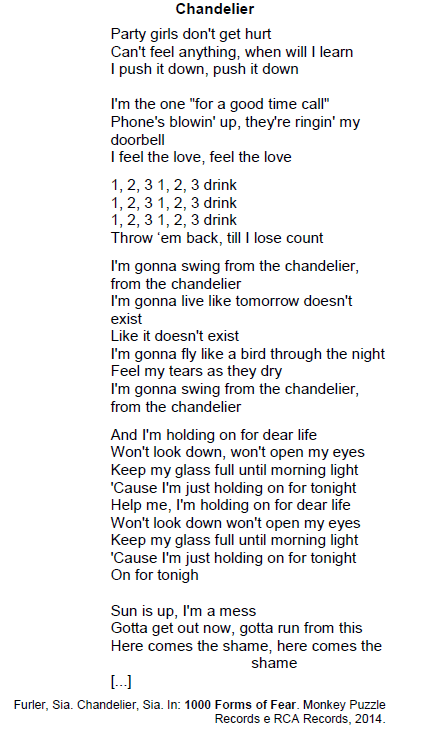Questões de Língua Inglesa do ano 2014
Lista completa de Questões de Língua Inglesa do ano 2014 para resolução totalmente grátis. Selecione os assuntos no filtro de questões e comece a resolver exercícios.
Língua Inglesa - Interpretação de Texto - Intituto de Desenvolvimento Educacional, Cultural e Assistencial Nacional (IDECAN) - 2014

- A. Rubén was hurt in an accident.
- B. Rubéns face got several stiches.
- C. Rubéns face has had a lot of zits.
- D. Demetrias raised from the dead.
- E. Demetria prayed for his recovery.
Língua Inglesa - Gramática - Intituto de Desenvolvimento Educacional, Cultural e Assistencial Nacional (IDECAN) - 2014
Read the dialogue in the picture. Choose the option to fill in the blank.

- A. Had been dubbed
- B. Cant keep up with
- C. Wont raise a racket
- D. Am not in the mood
- E. Am talking in riddles

Letras de músicas abordam temas que, de certa forma, podem ser reforçados pela repetição de trechos ou palavras. O fragmento da canção Chandelier, por exemplo, permite conhecer o relato de alguém que
- A. curte a vida festeira com alegria e vive a vida intensamente como se o amanhã não existisse.
- B. possui uma fusão de sentimentos ao se encontrar alcoolizada.
- C. precisa festejar para se sentir amada e querida e que se sente abandonada nos momentos de solidão.
- D. se sente só até mesmo em festas e luta para que as pessoas ao seu redor não percebam sua melancolia.
A sentença Jane _____ cook pasta very well. é CORRETAMENTE completada com
- A. can
- B. dont
- C. is
- D. would have
Leia as sentenças abaixo:
I. The waiter that served me at the coffe shop moved away.
II. He saw that the bottles were empty.
III. Carla told me that she was going to quit the restaurant where she works in.
IV. I didnt get the job that I applied for.
Em qual (is) das sentenças acima o uso do pronome relativo em negrito é extremamente necessário?
- A. I.
- B. I, IV.
- C. II, IV.
- D. III, IV.
Assinale a alternativa que apresenta os termos que preenchem CORRETAMENTE as lacunas existentes nos enunciados seguintes, de cima para baixo:
I. These bees ___________ kept in a large hive before they were taken out and examined by the beekeeper.
II. A thief came into his house, tied him up, took his money, and left. He ___________ tied up for several hours.
III. John doesn't cook very well. He _____________ helped by his wife.
IV. Amanda is pregnant. She expects her baby ______________ in November.
- A. are - has been - was - been born
- B. had been - has been - was being - to be born
- C. had been - was - had been - was born
- D. has been - had been - had being - to be born
Levando em consideração as diferentes formas de se referir a ações no futuro, analise os itens seguintes:
I. Claire is working at the library on Friday morning.
II. When I retire, I am going to go back to Liverpool to live.
III. The telephone is ringing, but I wont answer it.
IV. James and Sarah are working two jobs to afford a private school for their children.
O emprego dos termos em destaque está CORRETO apenas em
- A. I.
- B. III e IV.
- C. I, II e III.
- D. I, II, III e IV.
 De acordo com o texto acima, as expressões destacadas for, every once in a while e yet podem ser substituídas, sem prejuízo de sentido, respectivamente, por
De acordo com o texto acima, as expressões destacadas for, every once in a while e yet podem ser substituídas, sem prejuízo de sentido, respectivamente, por
- A. because, sometimes, but.
- B. of, everytime, however.
- C. so, then, despite.
- D. to, sometimes, however.
Leia o diálogo abaixo:.
Douglas: Its good to have you here, cousin! Would you like some wine? Claudia: Sure. Douglas, remember when we were kids and we used to visit grandma every Sunday for lunch? Douglas: Yes. We would spend the whole day playing in the backyard! Too bad we cant turn back time Claudia: Youre right I guess I would have spent more time with her. She used to take such good care of us. She would make us those delicious chocolate chip cookies, then she would buy us all Christmas presents.!
She has always enjoyed being around her grandchildren!
Douglas: Yeah If I had grandchildren, I would be exactly like she was to us.
Claudia: So would I! I would rather be like her than being a lonely old lady.
De acordo com o diálogo acima, nas expressões destacadas, o verbo modal would é empregado para indicar, respectivamente,
- A. interesse; condição passada; hábito passado; hipótese; preferência.
- B. interesse; hábito passado; condição; situação futura; habilidade passada.
- C. preferência; fato passado; hipótese; planos futuros; interesse.
- D. preferência; hipótese passada; hipótese; interesse; condição futura.
 De acordo com o texto acima, o painel convocado pela Organização Mundial de Saúde tem por objetivo discutir sobre
De acordo com o texto acima, o painel convocado pela Organização Mundial de Saúde tem por objetivo discutir sobre
- A. a ética do emprego de drogas não registradas no combate ao vírus.
- B. a ética empregada dentro dos laboratórios médicos no combate ao vírus.
- C. as medidas de não propagação da doença via setor aéreo para o continente africano.
- D. os índices de mortalidade causados pelo vírus no continente africano.


